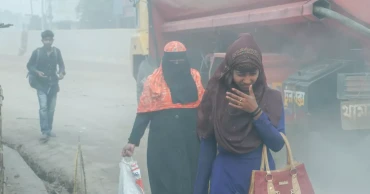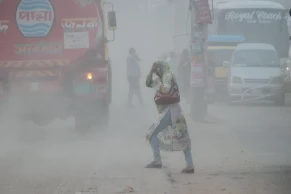Air Quality Index (AQI)
Dhaka 3rd most polluted city in the world Tuesday morning
Dhaka ranked third on the list of cities worldwide with the worst air quality with an AQI score of 184 at 9:00 am on Tuesday morning.
Dhaka’s air was classified as “unhealthy,” according to the air quality index (AQI).
Dhaka’s air ‘unhealthy’ Monday morning
India's Delhi and Senegal’s Dakar occupied the first and second spots in the list, with AQI scores of 299 and 225, respectively.
An AQI between 151 and 200 is considered 'unhealthy' while 201-300 is 'very unhealthy' and 301-400 is considered 'hazardous', posing severe health risks to residents.
The AQI, an index for reporting daily air quality, informs people how clean or polluted the air of a certain city is and what associated health effects might be a concern for them.
The AQI in Bangladesh is based on five pollutants: particulate matter (PM10 and PM2.5), NO2, CO, SO2, and ozone.
Dhaka’s air quality ‘unhealthy’ this morning
Dhaka has long been grappling with air pollution issues. Its air quality usually turns unhealthy in winter and improves during the monsoon.
11 months ago
Dhaka’s air ‘unhealthy’ Monday morning
Dhaka ranked sixth on the list of cities with the worst air quality with an AQI score of 176 at 8:28 am on Monday.
The air was classified as “unhealthy,” according to the AQI index.
Dhaka air quality ‘unhealthy’ Tuesday morning
Senegal’s Dakar, India’s Delhi and Pakistan’s Lahore occupied the first, second, and third spots on the list, with AQI scores of 238, 219 and 202 respectively.
When the AQI value for particle pollution is between 50 and 100, air quality is considered ‘moderate’, usually sensitive individuals should consider limiting prolonged outdoor exertion, between 101 and 150, air quality is considered ‘unhealthy for sensitive groups’, between 150 and 200 is ‘unhealthy’, between 201 and 300 is said to be 'very unhealthy', while a reading of 301+ is considered 'hazardous', posing serious health risks to residents.
The AQI, an index for reporting daily air quality, informs people how clean or polluted the air of a certain city is and what associated health effects might be a concern for them.
The AQI in Bangladesh is based on five pollutants: particulate matter (PM10 and PM2.5), NO2, CO, SO2, and ozone.
Dhaka air ‘unhealthy for sensitive groups’ Sunday morning
Dhaka has long been grappling with air pollution issues. Its air quality usually turns unhealthy in winter and improves during the monsoon.
As per World Health Organization (WHO), air pollution kills an estimated seven million people worldwide every year, mainly due to increased mortality from stroke, heart disease, chronic obstructive pulmonary disease, lung cancer, and acute respiratory infections.
11 months ago
Dhaka air turns ‘unhealthy’ Tuesday morning
Dhaka has ranked the sixth on the list of cities with the worst air quality with an AQI score of 171.
The air was classified as “unhealthy” at 8:31 am on Tuesday, according to the AQI index.
Pakistan’s Lahore, Egypt’s Cairo and Myanmar’s Yangon occupied the first, second, and third spots on the list, with AQI scores of 289, 217 and 192 respectively.
Dhaka’s air world's worst on Monday morning
When the AQI value for particle pollution is between 50 and 100, air quality is considered ‘moderate’, usually sensitive individuals should consider limiting prolonged outdoor exertion, between 101 and 150, air quality is considered ‘unhealthy for sensitive groups’, between 150 and 200 is ‘unhealthy’, between 201 and 300 is said to be 'very unhealthy', while a reading of 301+ is considered 'hazardous', posing serious health risks to residents.
The AQI, an index for reporting daily air quality, informs people how clean or polluted the air of a certain city is and what associated health effects might be a concern for them.
The AQI in Bangladesh is based on five pollutants: particulate matter (PM10 and PM2.5), NO2, CO, SO2, and ozone.
Dhaka has long been grappling with air pollution issues. Its air quality usually turns unhealthy in winter and improves during the monsoon.
Nearly everyone in the world breathes polluted air
As per World Health Organization (WHO), air pollution kills an estimated seven million people worldwide every year, mainly due to increased mortality from stroke, heart disease, chronic obstructive pulmonary disease, lung cancer, and acute respiratory infections.
1 year ago
Dhaka’s air quality ‘moderate’ this morning
Dhaka's air quality continued to be in the ‘moderate’ zone on Friday.
With an air quality index (AQI) score of 66 at 9:06 am, Dhaka today ranked 25th on the list of cities worldwide with the worst air quality.
An AQI between 50 and 100 is considered ‘moderate’ with an acceptable air quality. However, there may be a moderate health concern for a very small number of people who are unusually sensitive to air pollution.
Also read: Thanks to monsoon, Dhaka's air quality 'moderate' this morning
Indonesia’s Jakarta, Pakistan’s Lahore and Chile’s Santiago occupied the first three spots on the list, with AQI scores of 158, 156 and 153, respectively.
An AQI between 101 and 200 is considered ‘unhealthy’, particularly for sensitive groups.
Similarly, an AQI between 201 and 300 is said to be ‘poor’, while a reading of 301 to 400 is considered ‘hazardous’, posing serious health risks to residents.
Also read: Dhaka's air quality remains in 'moderate' zone
In Bangladesh, the AQI is based on five criteria pollutants – Particulate Matter (PM10 and PM2.5), NO2, CO, SO2 and Ozone.
Dhaka has long been grappling with air pollution issues. Its air quality usually turns unhealthy in winter and improves during the monsoon.
Air pollution consistently ranks among the top risk factors for death and disability worldwide. Breathing polluted air has long been recognised as increasing a person’s chances of developing a heart disease, chronic respiratory diseases, lung infections and cancer, according to several studies.
As per the World Health Organization (WHO), air pollution kills an estimated seven million people worldwide every year.
Also read: Dhaka's air 3rd most polluted in the world this morning
2 years ago
Dhaka's air quality ‘moderate’ this morning
Dhaka's air quality is ‘moderate’ this morning (March 21, 2023).
With an air quality index (AQI) score of 86 at 9:15 am, Dhaka ranked 27 in the list of cities worldwide with the worst air quality.
China's Beijing, Pakistan's Karachi and South Korea's Incheon occupied the first three spots in the list, with AQI scores of 194, 181 and 172, respectively.
Read: 9-point directive on air pollution: HC asks DoE to submit report within 2 weeks
An AQI between 101 and 150 is considered 'unhealthy', AQI between 201 and 300 is said to be 'very unhealthy', while a reading of 301+ is considered 'hazardous', posing serious health risks to residents.
In Bangladesh, the AQI is based on five criteria pollutants -- Particulate Matter (PM10 and PM2.5), NO2, CO, SO2 and Ozone.
Dhaka has long been grappling with air pollution issues. Its air quality usually turns unhealthy in winter and improves during the monsoon.
Air pollution consistently ranks among the top risk factors for death and disability worldwide.
Read: Dhaka’s air pollution: HC asks what steps have been taken
As per the World Health Organization (WHO), air pollution kills an estimated seven million people worldwide every year, largely as a result of increased mortality from stroke, heart disease, chronic obstructive pulmonary disease, lung cancer and acute respiratory infections.
2 years ago
AQI: Dhaka’s air still unhealthy this morning
Dhaka’s air quality is still in the 'unhealthy' zone this morning (March 10, 2023).
With an air quality index (AQI) score of 163 at 9:30 am, the capital of Bangladesh ranked 11th in the list of cities worldwide with the worst air quality.
Pakistan’s Lahore, India’s Delhi, and China’s Wuhan occupied the first three spots, with AQI scores of 239, 213, and 203, respectively.
An AQI between 151 and 200 is considered ‘unhealthy’ while between 201–300 is ‘’very unhealthy’, and 301–400 is 'hazardous', posing severe health risks to residents.
The AQI, an index for reporting daily air quality, informs people how clean or polluted the air of a particular city is and what associated health effects might be a concern for them.
The AQI in Bangladesh is based on five pollutants: particulate matter (PM10 and PM2.5), NO2, CO, SO2, and ozone.
Dhaka has long been grappling with air pollution issues. Its air quality usually turns unhealthy in winter and improves during the monsoon.
Air pollution consistently ranks among the top risk factors for death and disability worldwide. Breathing polluted air has long been recognised as increasing a person’s chances of developing heart disease, chronic respiratory diseases, lung infections, and cancer, according to several studies.
As per World Health Organization (WHO), air pollution kills an estimated seven million people worldwide every year, mainly due to increased mortality from stroke, heart disease, chronic obstructive pulmonary disease, lung cancer, and acute respiratory infections.
2 years ago
Air quality: Dhaka world’s 2nd most polluted city this morning
Dhaka's air quality continued to be in the 'unhealthy' zone on Monday morning.
With an air quality index (AQI) score of 195 at 9am, the metropolis ranked second in the list of world cities with the worst air quality.
An AQI between 101 and 200 is considered 'unhealthy', particularly for sensitive groups.
Read more: Dhaka’s air quality ‘very unhealthy’ this morning
India’s Delhi and Kolkata occupied the first and third spots in the list, with AQI scores of 225 and 188, respectively.
An AQI between 201 and 300 is said to be 'poor', while a reading of 301 to 400 is considered 'hazardous', posing serious health risks to residents.
In Bangladesh, the AQI is based on five criteria pollutants -- Particulate Matter (PM10 and PM2.5), NO2, CO, SO2 and Ozone.
Dhaka has long been grappling with air pollution issues. Its air quality usually turns unhealthy in winter and improves during the monsoon.
Read more: Dhaka's air quality is still 'unhealthy'
Air pollution consistently ranks among the top risk factors for death and disability worldwide. Breathing polluted air has long been recognised as increasing a person’s chances of developing a heart disease, chronic respiratory diseases, lung infections and cancer, according to several studies.
As per the World Health Organization (WHO), air pollution kills an estimated seven million people worldwide every year, largely as a result of increased mortality from stroke, heart disease, chronic obstructive pulmonary disease, lung cancer and acute respiratory infections.
3 years ago
Thanks to rain, Dhaka's air quality 'good' this morning
Dhaka's air quality has turned "good" due to rains triggered by cyclone ‘Sitrang’.
With an air quality index (AQI) score of 41 at 9 am Monday, the metropolis ranked 56th in the list of world cities with the worst air quality.
An AQI between 0 and 50 is considered to be ‘good’ while between 50 and 100 ‘moderate’.
Pakistan’s Lahore, Vietnam’s Hanoi and Mongolia’s Ulaanbaatar occupied the first three spots in the list, with AQI scores of 328, 176 and 164, respectively.
An AQI between 101 and 200 is considered 'unhealthy', particularly for sensitive groups.
Similarly, an AQI between 201 and 300 is said to be 'poor', while a reading of 301 to 400 is considered 'hazardous', posing serious health risks to residents.
AQI, an index for reporting daily air quality, is used by government agencies to inform people how clean or polluted the air of a certain city is, and what associated health effects might be a concern for them.
In Bangladesh, the AQI is based on five criteria pollutants -- Particulate Matter (PM10 and PM2.5), NO2, CO, SO2 and Ozone.
Dhaka has long been grappling with air pollution issues. Its air quality usually turns unhealthy in winter and improves during the monsoon.
A report by the Department of Environment (DoE) and the World Bank in March 2019 pointed out that the three main sources of air pollution in Dhaka "are brick kilns, fumes from vehicles and dust from construction sites".
With the advent of winter, the city’s air quality starts deteriorating sharply due to the massive discharge of pollutant particles from construction work, rundown roads, brick kilns and other sources.
Air pollution consistently ranks among the top risk factors for death and disability worldwide. Breathing polluted air has long been recognised as increasing a person’s chances of developing a heart disease, chronic respiratory diseases, lung infections and cancer, according to several studies.
As per the World Health Organization (WHO), air pollution kills an estimated seven million people worldwide every year, largely as a result of increased mortality from stroke, heart disease, chronic obstructive pulmonary disease, lung cancer and acute respiratory infections.
3 years ago
AQI: Dhaka's air quality improves after morning rain
Bangladesh’s capital Dhaka saw improvement in its air quality Sunday morning as showers lashed the city in the hours of the day.
Dhaka's air quality has turned 'moderate’ in the Air Quality Index (AQI) with score of 62 at 9 am on Sunday and it ranked 26th in the list of world cities with the worst air quality.
Read: Dhaka's air quality is 'unhealthy'
An AQI between 50 and 100 is considered ‘moderate’ with an acceptable air quality. However, there may be a moderate health concern for a very small number of people who are unusually sensitive to air pollution.
Uzbekistan’s Tashkent, Pakistan’s Lahore and India’s Delhi occupied the first three spots in the list, with AQI scores of 193, 166 and 157, respectively.
An AQI between 101 and 200 is considered 'unhealthy', particularly for sensitive groups.
Similarly, an AQI between 201 and 300 is said to be 'poor', while a reading of 301 to 400 is considered 'hazardous', posing serious health risks to residents.
In Bangladesh, the AQI is based on five criteria pollutants -- Particulate Matter (PM10 and PM2.5), NO2, CO, SO2 and Ozone.
Read: Dhaka’s air ‘unhealthy for sensitive groups’ this morning
Dhaka has long been grappling with air pollution issues. Its air quality usually turns unhealthy in winter and improves during the monsoon.
Air pollution consistently ranks among the top risk factors for death and disability worldwide. Breathing polluted air has long been recognised as increasing a person’s chances of developing a heart disease, chronic respiratory diseases, lung infections and cancer, according to several studies.
As per the World Health Organization (WHO), air pollution kills an estimated seven million people worldwide every year, largely as a result of increased mortality from stroke, heart disease, chronic obstructive pulmonary disease, lung cancer and acute respiratory infections.
3 years ago
Dhaka's air quality 'moderate' this morning
Dhaka's air quality has turned 'moderate'.
With an air quality index (AQI) score of 74 at 9 am on Sunday, the metropolis ranked 14th in the list of world cities with the worst air quality.
An AQI between 50 and 100 is considered ‘moderate’ with an acceptable air quality. However, there may be a moderate health concern for a very small number of people who are unusually sensitive to air pollution.
Read: Dhaka's air quality remains 'moderate'
The UAE’s Dubai, Indonesia’s Jakarta and China’s Wuhan occupied the first three spots in the list, with AQI scores of 158, 156 and 141, respectively.
An AQI between 101 and 200 is considered 'unhealthy', particularly for sensitive groups.
Similarly, an AQI between 201 and 300 is said to be 'poor', while a reading of 301 to 400 is considered 'hazardous', posing serious health risks to residents.
In Bangladesh, the AQI is based on five criteria pollutants -- Particulate Matter (PM10 and PM2.5), NO2, CO, SO2 and Ozone.
Dhaka has long been grappling with air pollution issues. Its air quality usually turns unhealthy in winter and improves during the monsoon.
Read:Dhaka’s air quality ‘unhealthy’ this morning
Air pollution consistently ranks among the top risk factors for death and disability worldwide. Breathing polluted air has long been recognised as increasing a person’s chances of developing a heart disease, chronic respiratory diseases, lung infections and cancer, according to several studies.
As per the World Health Organization (WHO), air pollution kills an estimated seven million people worldwide every year, largely as a result of increased mortality from stroke, heart disease, chronic obstructive pulmonary disease, lung cancer and acute respiratory infections.
3 years ago



















